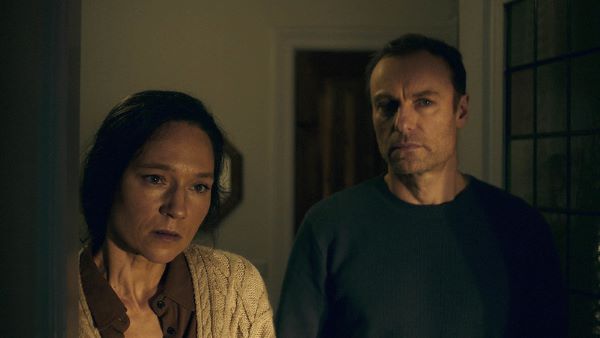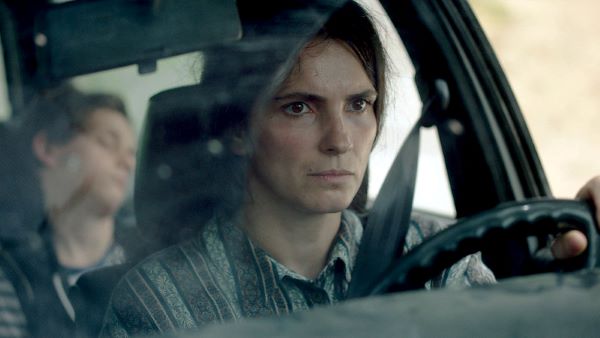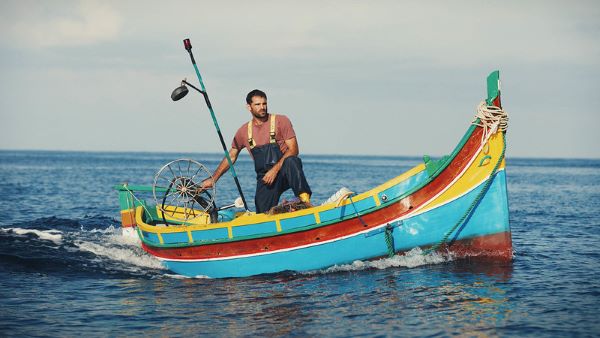
Viewers who had the good fortune to dive into the Sundance Film Festival’s programming this year have Europe to thank. Many of the best works were funded by European government subsidies. Familiar entities popping up in the opening credits included the Swedish Film Institute, Nordisk Film & TV Fund, and the BBC, to name a few. All of Sundance’s programming was available for the first time online for U.S. viewers, since all in-person events at Park City, Utah, were cancelled this year because of the ongoing pandemic.
One of the most intriguing entries (and dare I say sophisticated selections anywhere in the festival) was the intriguingly intricate Human Factors, the second film by director Ronny Trocker, which was co-produced by German public broadcast ZDF and the German Federal Film Fund, among others. It’s well acted and directed through and through, and its puzzle-like structure reveals one betrayal at a time, making editor Julia Drack one of the film’s stars.
Under overcast skies and rainy weather, the noirish family drama plays out like a thriller, where each family member has a secret—stressed out adult, teen, or adolescent—set against a home invasion. The film begins from the perspective of an outsider, an intruder into the Belgium country home of a bilingual middle-class family living in Hamburg. Mom and dad run an advertising agency together, but Jan (Mark Waschke) has gone behind Nina’s (Sabine Timoteo) back and brokered a deal to run a political campaign, though they had both sworn never to enter politics. That’s just one of the many conflicts and betrayals under the same roof.
Based on this brief description, the movie could be connected to the output of Michael Haneke, like Cache and Code Unknown, where there is also the fear of the foreigner/intruder and a family living through unspoken tension. Resentment and anger simmer underneath the unpredictable actions of this quartet, but Trocker has thankfully a lighter touch than Haneke. He adds a healthy dose of humor, given there is another important point of view added to the mix: the pet rodent, Zorro. Think of it as Rashomon with a rat—with the camera darting about at Zorro’s eye level.

Pleasure, the debut film by Swedish director Ninja Thyberg, was one of the hottest tickets at the festival—its online screenings sold out. Perhaps it was for the blunt, high-concept story line or the warning on the festival’s website: you had to be 18 to view this descent into the world of hardcore pornography. Among the film’s producers were the Swedish Film Institute and the Netherlands Film Fund. It’s hard to imagine any U.S. film festival or nonprofit attaching its name to a movie that involves bondage, erections, and brutal, rapey sex. Viewers are in for a tense 109 minutes.
When 19-year-old Linnéa (Sofia Kappel, in the definition of a brave performance) arrives from Sweden at LAX, she’s asked by a customs official what brings her to Los Angeles. Pleasure, she answers. With a single-minded focus, she sets out to become a top-tier star under the nom de porn Bella Cherry, which is tattooed in cursive on her forearm.
Thyberg gets straight to the point. There’s nothing coy about the depiction of Bella’s line of work. The script treats her like a pawn who steadily moves up the rungs of the industry. The film sets out to shock, and it succeeds, leaving little to the imagination, though no actual sex is seen. Yet Bella, along with the audience, is never quite sure why she pursues this career with such fervor. She offhandedly and vaguely offers an explanation for going after a porn career: other Swedes are boring, and “They like feeling sorry for themselves.”
Instead of a character study, or titillation, the director goes for discomfort, especially when dealing with the question of coercion and consent during a shoot with Bella and two men who are really slapping her around. In another attempt to prove to producers that she has no limits, she participates in her first double penetration scene. On a scale of cringeworthy moments, these scenes are a 10. (Apart from Kappel, the rest of the cast has worked within the adult film industry.)
You can’t help but think of Showgirls as Bella becomes fixated on becoming a star on the level of a Spiegler girl—the film’s version of Vivid girls—namely the aloof Ava (Evelyn Claire), a cross between Bettie Page and Veronica Lake. Yet at its heart, Pleasure is a morality tale which has more to do with the effort to maintain personal values in a line of work that undermines them. It’s really a buddy film between Lena and Joy (Revika Anne Reustle), from Florida, who has been working longer in the industry but hasn’t broken out as a star. Their relationship gives the film a welcome and faintly beating pulse.
A24 will release the unedited version seen at Sundance and an R-rated version later this year.

Hive, Sundance’s first film from Kosovo, won three honors: an audience award, one for direction for debut writer/filmmaker Blerta Basholli, and the World Cinema Grand Jury Prize. In terms of how it tells its story, the Kosovan/North Macedonian/Swiss production is the antithesis to the other big winner at this year’s festival, the tear-jerking and crowd-pleasing CODA, for its subtle and quieter tone.
Based on real events, it’s set in the mid-2000s, seven years after a massacre by Serbian forces occurred in the Kosovan village where the husband of Fahrije Hoti (Yllka Gashi) and dozens of other men are still missing. The thirtysomething Fahrije has since maintained her husband’s bee hives, though the honey isn’t raking in a lot of euros at the local market. To provide more for her teenage daughter, young son, and father-in-law, she gets her driver’s license and a used car through a woman’s organization that aids widows of the Balkan conflict. Finding a job should now be easier.
But her unorthodox behavior unleashes a hostile, and violent, reaction from her tightly traditional, patriarchal community. She becomes estranged from friends, her daughter (who calls her a “whore”), and her displeased father-in-law (“You have to know your place in the family”). Adding more grist to the rumor mill, she takes one step further and starts a business, making the red pepper spread ajvar to sell in a florescent supermarket in the capital of Pristina.
The screenplay carefully lays out the obstacles set before Fahrije in a black-and-white conflict, though the director leaves it to the audience to know when to stand up and cheer. Beat by beat, it’s dutifully told and would feel at home in the Critics’ Week sidebar at either Venice or Cannes, but would have likely been lost in a larger festival like a pre-pandemic Toronto.

The only other winner in the World Cinema Dramatic category, Luzzu, was touted as the first Sundance selection from another European country, Malta, and is one of the few Maltese movies ever made, according to its writer/editor/director, Maltese-American Alex Camilleri. His lead, real-life fisherman Jesmark Scicluna, won the World Cinema Dramatic Special Jury Award for his first acting role.
Here is another European film that takes a different path from the emotional workout of CODA. Camilleri also creates an uphill struggle for a working-class protagonist but maintains an even keel, to borrow a nautical term, tone. However, these two wildly different movies coincidentally have something in common: the fate of the independent fisherman.
Scruffy, boyishly handsome, and temperamental, Jesmark (Scicluna, who heads a mostly nonprofessional cast) barely makes a living fishing on his 12-foot-long wooden boat, a luzzu, but it’s leaking and put out of commission. He thus faces the prospect of becoming the last in his family to ply the seas. Though he’s only in his 20s, he’s resistant to change. Most of his brethren have taken buyouts from the European Union, money in exchange for their boats so they can pursue other livelihoods.
Adding to his financial needs, he and his wife just had a baby, who, being underweight, needs the care of a specialist, causing Jesmark to sacrifice his integrity for his family—there’s more money to be had in the black market—but the director has a clear eye, never succumbing to sentimentality or an uncomplicated resolution. His film has lovely, observational moments, such as when Jesmark imprints his baby boy’s painted feet next to his, from a generation earlier, on the luzzu. Everything is in moderation, including the postcard perfect views that set the stage without overwhelming the story.
Camilleri has found a real discovery in his lead actor. Viewers never know what to expect from Jesmark, who hints at hot head haughtiness, and the struggling fisherman does become involved in some shady dealings. Like CODA and Hive, this is another movie about a community, although one fading into the past, but not without a fight.
Incidentally, the micro-budgeted Luzzu was made possible by the Malta Film Fund, the Malta Film Commission, and the government of Malta.
















Leave A Comment